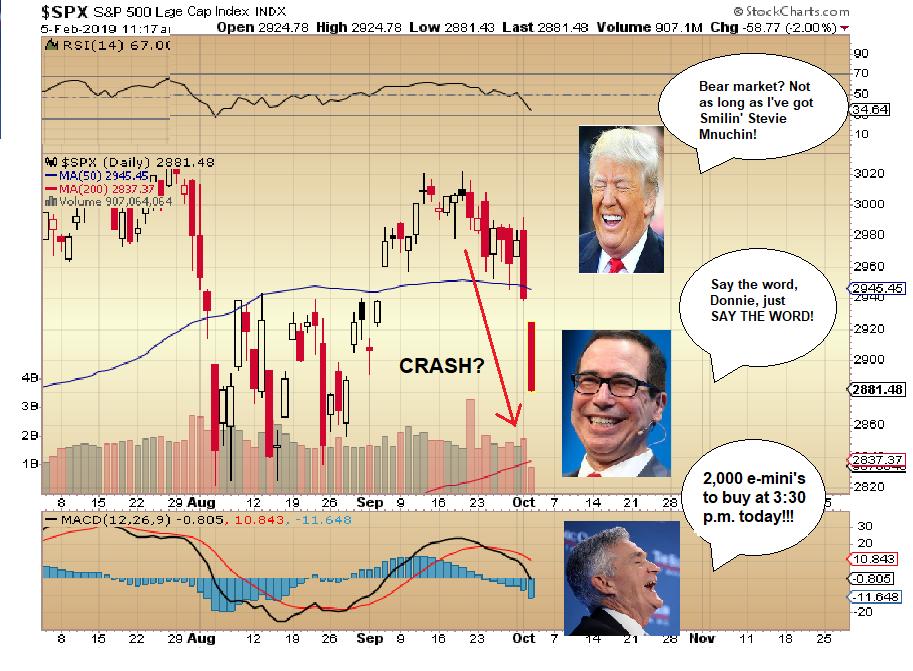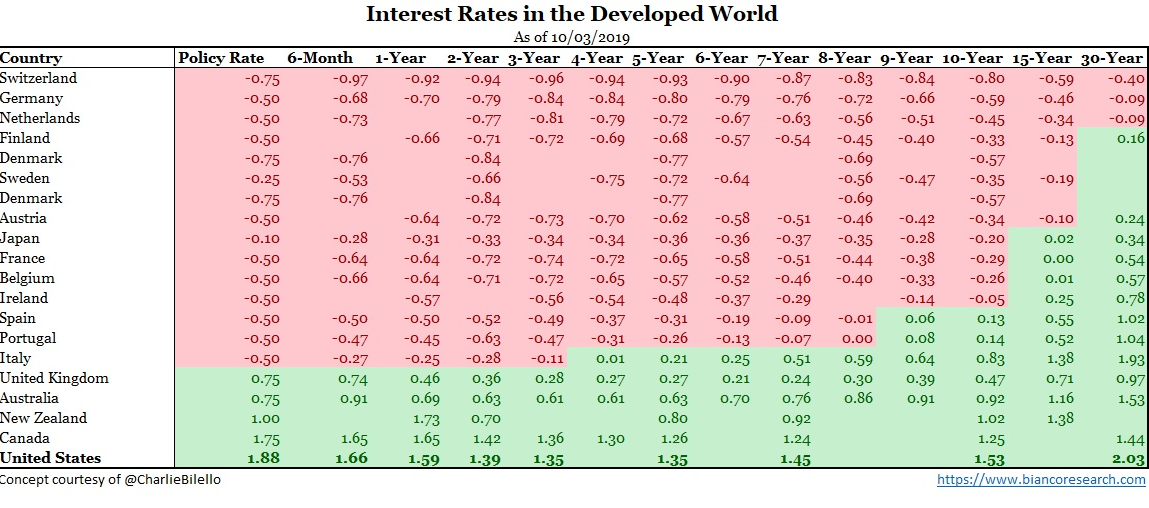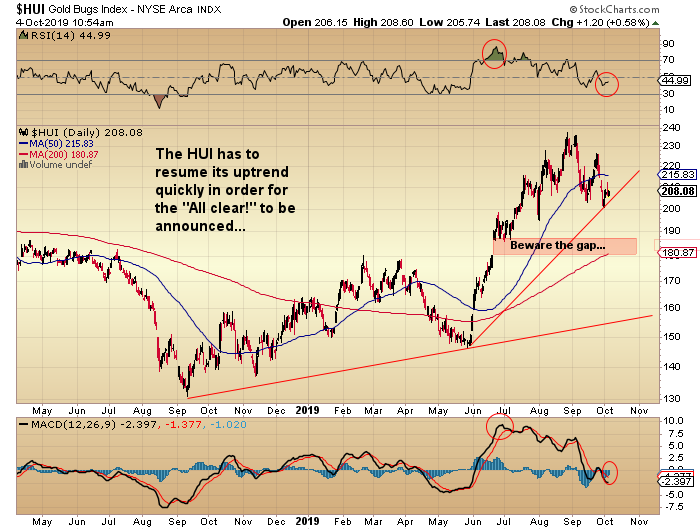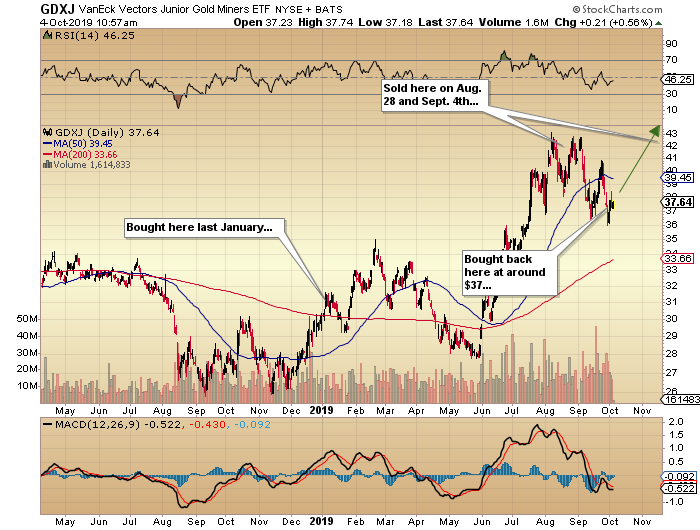On Wednesday, as the kiddies were upset over a swooning S&P, then trading a paltry 5% from the all-time high of 3,027.

All is now right with the world, and stocks are charging back toward the highs with a 57-point turnaround in the S&P in less than two trading sessions. As I tweeted out [yesterday], it was (and is) laughingly predictable.
Now, to underscore the absurdity of this obsession with rising stock markets, take a peak at the next graphic courtesy of Bianco Research. The pink section is all bonds trading at a negative yield, while the green is what would be historically "normal"—you know, a bond that pays the holder that is taking all of the risk a positive return. Is it any wonder that money managers around the world are all flooding into stocks, when over 50% of sovereign (not corporate) bonds are penalizing their owners?

Do any of you recall the term "lender of last resort?" That term refers to the reason why sovereign bonds and bills are assigned a heavenly credit rating, which assumes that, because they own and control the power of taxation, there will always be a working population upon which governments can rely for interest coverage. Where corporations and individuals can file for bankruptcy protection in favor of the bondholder, sovereign nations enjoy the realm of privilege and are blindly obeyed until exogenous shocks to the status quo occur, which place a sovereign nation in default.
The last two countries to default on debt were Greece and Venezuela, and while Greece has had its standard of living stabilized under the shelter of the ECB (European Central Bank) umbrella, Venezuela has no such safety net and its citizens are suffering a malaise not unlike Wiemar Germany 1921–1923 or Zimbabwe post-1986. Now look at this list of countries on "credit default watch," as measured by spreads on credit default swaps.
- Ukraine
- Pakistan
- Egypt
- Brazil
- South Africa
- Russia
- Portugal
- Kazakhstan
- Turkey
- Vietnam
Around the turn of the century, there was an acronym that combined four countries believed to be global growth drivers for the new millennium, then known as BRIC (Brazil, Russia, India and China). They were the darlings of the Wall Street analytical community for years until quite recently. For reasons beyond all logic, two out of four of them are now on the "watch list" (Brazil and Russia), with China's current trade war with the West and its suspect shadow banking system making them a soon-to-be-added member. South Africa used to be one of the most dependable and credit-worthy countries on the planet until a socialist thug took over (sharing a common history with Venezuela), and Brazil was once lauded and applauded for its thriving mining and agricultural foundations. Even Germany, the industrial and political backbone of the ECB, has not one bond or bill yielding positive returns.
I submit to you, my friends, that the malaise to which I refer, starting with the blatant control of all markets (bonds, stocks, Forex and commodities) by government interference is symptomatic of the accelerating early stages of a massive global debt disease. You have read my thoughts on "mistrust"; now you actually can quantify it in the chart shown above. Those negative yields are a wailing air-raid siren, just like 1941 London, and the 2019 version of the Luftwaffe is debt, pure and simple.
The best and only real defense against a debt implosion is to have your wealth held outside of the traditional banking system, because as we have seen in the countries over time that have defaulted, governments, aided and abetted by their police and armed forces, think nothing of confiscating your wealth "for the common good," meaning, for their "job security." They cannot confiscate that which they don't see, which is precisely why they are jamming the notion of a "cashless society" down your throat. However, this is a very well-trodden path of discussion and debate that you have all heard and read before, so I shall move along.
Nothing new to be seen here:


The gold miners, as represented by the HUI (ARCA Gold Bugs Index), have treated me very well thus far in 2019, and while I lament the early exit from the leveraged ETFs (NUGT/JNUG), I did make decent money on both. But where I made "the cut" was on the exits of GDX (NYSE:GDX), VanEck Vectors Junior Gold Miners (NYSE:GDXJ), GBR.V., and the iShares Silver (NYSE:SLV) calls, all in that topping window from Aug. 28 until Sept. 5.
The hate mail I received was nothing short of profane, and in some cases threatening. While I looked on dispassionately, I dumped all of my precious metals paper holdings while retaining all physical positions in gold and silver. I have now started accumulating from the long side of the paper markets (miner ETFs), and have initiated a small position in the SLV December $18 calls, with two purchases in the past two weeks at $0.23 and $0.47, for an average price of $0.35. I look for a retest of the $18.35 high before year-end. As I stated a few missives ago, I feel far more comfortable owning these positions, with small losses or break-evens, than being on the sidelines with a pile of rotting cash, just sitting there in the full envious view of bankers and government bureaucrats.
As to gold and silver, my only point of concern is the gap shown above in the HUI chart. There is an old saw —all gaps must be closed—and whether or not this one proves to be true shall remain to be seen. I have chosen to disregard it because the cause of the gap was a runaway up-thrust in gold after the $1,375/ounce breakout. Like so many other "rules" that gold and silver have tossed aside since June, I am aware of the gap but simply not acting upon it.
I expect a massive reduction in the aggregate shorts in gold held by Commercials, offset by a similar reduction in longs held by Large Speculators. Watching the plunge in open interest and the sudden and very mysterious halt in the declines of the precious metals, it is eerily reminiscent of the same "mysterious" action when it topped on Sept. 4. It is the Commercial Cretins at work doing exactly what they have been doing for ages because it is obvious that the RICO action brought against JP Morgan has done squat to deter their criminal behaviors.